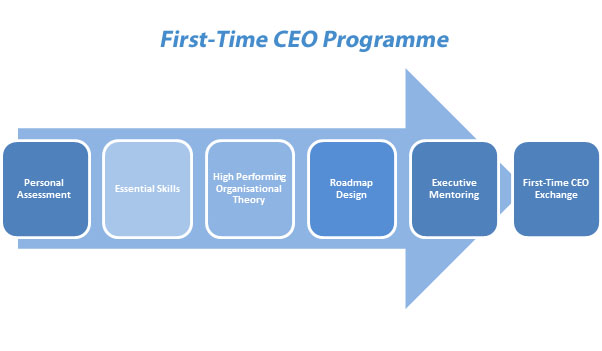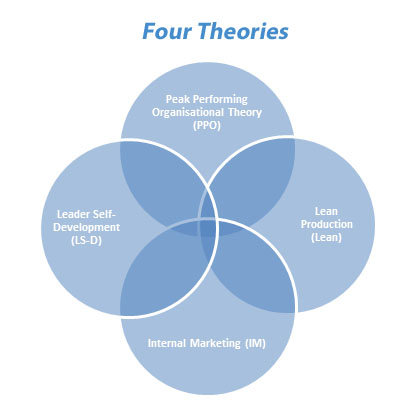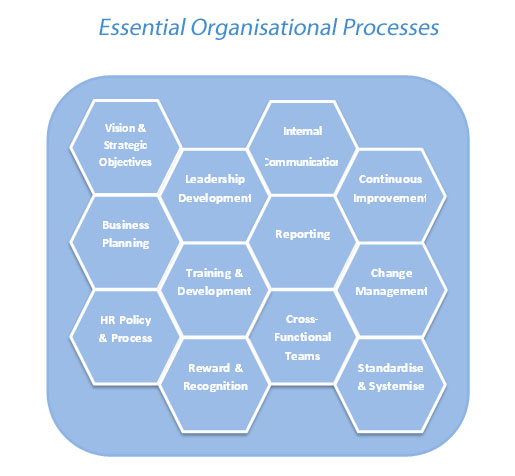A proposed course to enable senior managers to become effective Chief Executives with the personal and professional skills to develop high performing organisations.

If the goal is to create organisations where every leader is someone others are genuinely eager to follow, then let’s create great leaders of our senior managers, so they can build high performing organisations when they become Chief Executives, attracting and developing leadership talent in a sustainable way.
Making the Leap from Senior Manager to Chief Executive
The step-up from senior manager to Chief Executive is a significant change from being responsible for a department to leading an organisation.
The personal attributes, knowledge and skills required to be an effective Chief Executive and develop a high performance organisation are unique and there is an increased isolation and autonomy that many find challenging.
Appointing a first-time Chief Executive is also a business risk for Board of Directors, who need to put their faith in a person who does not have a relevant track record to lead the organisation and protect shareholder value.
Similarly, promoting an internal senior management candidate to fill the shoes of an outgoing Chief Executive carries the same risk, if not more so, as they need to change internal perceptions and existing relationships in order to take the helm competently and make the tough calls.
First-time Chief Executives need to be able to handle the fast-paced environment that requires effective judgement, self-control and discipline, effective leadership and the skills to keep the business moving forward without becoming distracted by the day-to-day operational demands and fire-fighting. They also need the confidence to pursue what they feel is the right direction.
Literature that discusses the focus of new Chief Executives in their first 100 days of a new CEO includes undertaking a systematic, initial assessment of their organisation. However, most first-time Chief Executives will not have experience of a high performing company against which to benchmark.
Being a first-time Chief Executive can be challenging, yet rewarding if you are prepared with the right mindset, skills, a roadmap that focuses you in the first year and an experienced mentor to coach you through the challenging times.

The idea ...
For an organisation that is already high performing, the programme will equip senior managers with the knowledge and skills that they need to continually improve and reinforce critical strategies in their existing position.
First-Time CEO is a natural progression from a Master of Business Administration (MBA) programme and leads into a Board of Director’s course, which equips a Chief Executive to become a first-time Board Member.
PROGRAMME DESIGN
- Personal Assessment - A series of individual assessments to provide candidates with a benchmark against the personal attributes, beliefs, skills and knowledge of high performing Chief Executives. This gives them a starting point for development and the basis for Executive Mentoring. This reflection and learning activity is an essential precursor to developing Essential Skills.
- Essential Skills - The programme provides candidates with critical, but often over-looked strategies, techniques and tools in: time management, change management, coaching and mentoring, reflection and self-development, networking and effective relationship management.
- High Performing Organisational Theory - Detailed review of four organisational theories that together provide philosophy, framework and tools to develop a high performing organisation by getting the basics right across the board.
- Roadmap Design - A high level process and benchmarking criteria for assessing an organisation against high performance criteria. The Roadmap will provide direction, purpose and perspective in their first year as a Chief Executive, even when operational demands increase.
- Executive Mentoring - A formal mentoring programme between the candidate and an experienced Chief Executive that lasts for one year, providing guidance for developing their skills, attributes and implementing the Roadmap. Executive Mentoring can be adapted for those candidates who are participating in this programme as part of leadership development and succession planning in their organisation.
- First-Time CEO Exchange - A professional network that links with previous classes to leverage experience, promote discussion and learning, and to form valuable peer relationships. Quarterly events are held as well as continuous discussion on best practice in an online environment that also provides members with research, information and tools to assist them in their role as Chief Executive.

HIGH PERFORMING ORGANISATIONAL THEORY
The four theories are proposed for forming the basis of high performing organisations, with synergies between each (see appendix in attachment).
- Peak Performing Organisational Theory (PPO) - People and performance strategy that transforms an organisation into a team of star players with clear line of sight between individual objectives and the company goal
- Leader Self-Development (LS-D) - Attracting self-developing leaders and developing company policy and processes to support them to continuously upskill
- Lean Production (Lean) - Continuous improvement and process redesign with a top-down, bottom-up approach
- Internal Marketing (IM) - Whole company ownership of internal and external marketing
ESSENTIAL ORGANISATIONAL PROCESSES
Rather than focusing on the functional departments of an organisation, the First-Time CEO programme will focus candidates on how to transform key organisational processes to build a sustainable foundation for a high performing organisation.
- Vision and Strategic Objectives
- Business Planning
- HR Policy and Process
- Leadership Development
- Training and Development
- Reward and Recognition
- Internal Communication
- Reporting
- Cross-Functional Teams
- Continuous Improvement
- Change Management
- Standardise and Systemise

First-time Chief Executives:
- Are equipped to assess their organisation against a benchmark for high performance across essential organisational processes.
- Have a clear, strategic roadmap, tools and experienced mentor to guide them in transforming their organisation for high performance in a managed way.
- Have the skills to manage their time with competing demands, maintain a strategic perspective, reflect and self-develop their leadership skills, and apply their mentoring skills to lead and develop employees.
- They attract the right, self-developing people to their organisation who are supported by business process to become leaders and operate at peak performance.
Other:
- An effective and challenging professional development programme for senior management succession planning, development of senior managers in high performing organisations and essential third-party support and professional networks to manage the initial risk associated with a first-time Chief Executive appointment.
- Growing the leadership talent pool in a way that not only develops high performing Chief Executives, but in turn they create a business environment that attracts and continuously develops employee talent and creates future leaders.
- Transform New Zealand’s economy through high performing, dynamic, innovative and effective leaders and their organisations; engender a continuous transfer of best practice knowledge.
- Consult widely with key stakeholders (Boards of Directors, Chief Executives, Senior Managers, MBA programme directors and Institute of Directors) to confirm the need for, and the components of, the First-Time CEO programme.
- Identify a suitable champion to manage and deliver the First-Time CEO programme; include Universities who deliver the Master of Business Administration programme.
- Review and evaluate the four theories against other theories on high performing organisations to ensure best practice is used in this programme.
- Research effective mentoring programmes and identify critical success factors.
- Identify and train experienced Chief Executives as mentors.
- Research effective professional networking groups and identify critical success factors, including face-to-face and e-networking infrastructure.
- Create a working group to finalise the First-Time CEO programme design, materials, trainers and relationships.
- Develop branding that positions the programme as the premium experience for first-time Chief Executives. Confirm target audience attributes and develop marketing channels and a marketing campaign.
- Run a pilot: Targeting the top 100 companies in New Zealand, in order of priority, to fill the pilot programme; the pilot is likely to be filled with senior managers whose Chief Executives and Board of Directors see value in developing them for succession as internal candidates for the Chief Executive position. Evaluate and improve the programme.
- Establish an ongoing First-Time CEO programme.
My experience as an employee at Meridian Energy (1999-2004) is the single greatest contributor to the thinking behind this hack. I wondered 'What process would I follow to replicate the dynamic, high performing and leader self-developing culture that I experienced at Meridian?".
I would like to acknowledge the following people who provided this transformational experience and who taught me most of what I know about business, thank you:
- Keith Turner, Chief Executive, Meridian Energy Ltd (1999-2008), New Zealand
- Ken Smales, General Manager, Renewable Energy, Meridian Energy Ltd, New Zealand
- And the other senior managers of Meridian Energy circa 1999
In addition to my experience at Meridian, the following have shaped my beliefs:
- The Goal (Theory of Constraints), Dr Eliyahu M Goldratt (21984)
- Blue Ocean Strategy, W. Chan Kim and Renee Mauborgne (2005)
- Peak Performing Organisational Theory - Implementation, Mike Pratt and Clive Gilson, New Zealand
These readings have influenced my hack:
- Reichard, R. J., & Johnson, S. K. (2011). Leader self-development as organizational strategy. The Leadership Quarterly, 22(1), 33-42.
- Various Internal Marketing materials, listed in the attachment: ‘Report - Internal Marketing’.
Other materials that I have read in relation to this hack are attached.



Angela,
I like the concept, I also would fit in to this gap between senior management & CEO on know the challenges moving up to my first GM or CEO role. I would sign up for the course!
- Log in to post comments
- Log in to post comments
This is an EXCELLENT idea. I accepted an internal move to CEO when the founder sold the company and retired. We were now a wholly owned subsidiary of a a publicly-traded, foreign owned firm and I need to drive change. I was GREEN. Moreover, i had some very odd internal dynamics to deal with....a colleague who was unhappy about my promotion.....and decided that sabotage was the way to go. Though we ended up delivering record results and evolving the culture.....it wasn't easy. This course would have been extremely valuable in helping me build skills, confidence, and a stronger leadership team....faster.
- Log in to post comments
This is an EXCELLENT idea. I accepted an internal move to CEO when the founder sold the company and retired. We were now a wholly owned subsidiary of a a publicly-traded, foreign owned firm and I need to drive change. I was GREEN. Moreover, i had some very odd internal dynamics to deal with....a colleague who was unhappy about my promotion.....and decided that sabotage was the way to go. Though we ended up delivering record results and evolving the culture.....it wasn't easy. This course would have been extremely valuable in helping me build skills, confidence, and a stronger leadership team....faster.
- Log in to post comments
- Log in to post comments
I like this. I really like the comments about looking at business processes rather than the more traditional functional bounded aspects of running a business.
If and when the time is right for me, this is a course I would really appreciate.
- Log in to post comments
- Log in to post comments





You need to register in order to submit a comment.